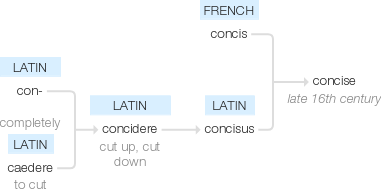Concise
late 16th century: from French concis or Latin concisus, past participle of concidere ‘cut up, cut down’, from con- ‘completely’ + caedere ‘to cut’.
wiktionary
From Late Latin concisus(“cut short”), from concidere(“cut to pieces”), from caedere(“to cut, to strike down”).
etymonline
concise (adj.)
"comprehending much in few words," 1580s, from Latin concisus "cut off, brief," past participle of concidere "to cut off, cut up, cut through, cut to pieces," from assimilated form of com-, here perhaps an intensive prefix (see con-), + caedere "to cut" (from PIE root *kae-id- "to strike"). Related: Concisely.
Concise frequently refers to style, and signifies the expression of much in few words; succinct is generally applied to the matter, the less important things being omitted: thus a concise style or phrase, but a succinct narrative or account. [Century Dictionary]
